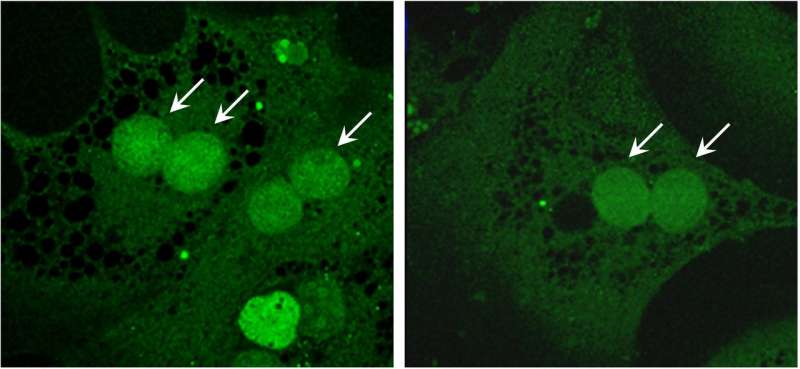Retinol saturase expressed (left). Retinol saturase depleted (right). (confocal microscopy, liver cells. Credit: M.Schupp
Researchers from Charité - Universitätsmedizin Berlin have identified an enzyme that has a major effect on glucose utilization in liver cells. The enzyme, retinol saturase, helps these cells adapt to variations in glucose levels. However, when glucose levels are consistently too high, retinol saturase appears to exert a damaging effect on cells. Results from this study have been published in the journal Nature Communications.
All cells can adapt their metabolic activity with respect to the availability of various sources of energy, such as glucose. This vital ability makes cells more efficient at absorbing and utilizing these substances, in addition to protecting them against the negative effects of overload. However, exposure to chronically-high glucose levels can result in an adaptive response which is damaging to cells and promoting diseases.
Led by Prof. Dr. Michael Schupp, head of the Molecular Pharmacology and Metabolism Working Group at Charité's Institute of Pharmacology, the researchers showed that the enzyme retinol saturase plays a role in the adaptive processes found in liver cells. By studying levels of the enzyme in both slim and obese participants, the researchers found that levels increase in line with body weight. They also analyzed the cells' metabolic pathways and their metabolic adaptation to glucose levels after reducing the enzyme's abundance. The negative metabolic effects associated with excess exposure to glucose were significantly less pronounced in cells that had been modified in this way.
Discussing the results of the study, Prof. Schupp concludes: "The inactivation of retinol saturase activity may offer a new approach to the treatment of metabolic liver disease and its associated problems, such as fatty liver disease and dyslipidemia." As a next step, the researchers are planning to identify the mechanisms involved, and to test whether other cell types also need the enzyme to adapt to changing glucose levels.
More information: Steffi Heidenreich et al, Retinol saturase coordinates liver metabolism by regulating ChREBP activity, Nature Communications (2017). DOI: 10.1038/s41467-017-00430-w
Journal information: Nature Communications
Provided by Charité - Universitätsmedizin Berlin





















